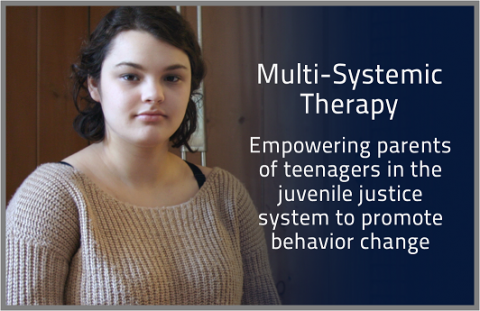Multisystemic Therapy (MST) is an evidence-based program (EBP) for adolescents with serious behavioral problems. Treatment is conducted in the home and in the community in a way, and at times that are flexible, to meet the goals of each youth and family based upon their own unique set of strengths and needs.
MST features the largest body of evidence, by far, of successful interventions for high-risk youth.
Program Outcomes
74 research studies of MST included 57,000 families and were reported on in 140 peer-reviewed journal
articles, showed through rigorous, scientific evaluations:
- reductions in long-term rates of criminal offending.
- 54% fewer arrests over 14 years
- 75% fewer violent felony arrests over 22 years
- reductions in rates of out-of-home placements.
- 54% fewer placements compared to usual services
- significant improvements in family functioning
- decreased mental health and substance use problems.
- cost-savings in comparison with usual mental health and juvenile justice services.
This all results in a $200,000 net benefit per youth a Return on Investment of $23.59 for every $1 spent on MST treatment.
MST does this through its intensive treatment program that addresses the multiple determinants of problem behaviors in adolescents.
This ecological treatment approach views individuals as being nested within a network of interconnected systems that encompass individual, family, and extra-familial factors such as peer groups, schools, the community, the courts, and other service systems. MST focuses on addressing the prioritized environmental systems that impact each individual youth and strives to promote behavior change in the young person's natural environment – their home and family, school, neighborhood, and friends.
MST works with youth ages 12 through 17 (exceptions can be requested for 10–11 &18 years old) who have a history of arrests and/ or other externalizing behaviors. A major goal of MST is to empower a youth’s caregiver/s by equipping them with the skills and resources needed to independently address the difficulties that arise in raising youth.
Within a context of support and skill building, the therapist places developmentally appropriate demands on the adolescent and family for responsible behavior. MST blends the best-practices of various clinical treatments into one convenient treatment package. Clinical interventions will be individualized to each youth and family based upon their unique strengths and needs, but may include strategies from strategic and structural therapy, parent behavior management training, contingency management for substance misuse, and cognitive behavioral interventions for caregiver/s and/ or youth.
MST recognizes that each system of care plays a critical role in a youth’s world, and each system requires attention when effective change is needed to improve the quality of life for youth and their families for the long term.
Many experts believe that evidence-based practices (EBPs) such as MST should be the standard for addressing the complex needs of youth with severe behavioral problems. MST clinical consultants at our center work with provider agencies to effectively deliver MST services, setting up a network of local partner organizations that are committed to the delivery of the MST model with full integrity and fidelity to preserve the positive outcomes found in the clinical trials of MST for each community, youth, and family they serve.
Interested agencies can contact Maureen Kishna at Maureen.Kishna@case.edu to discuss if MST is the right treatment program for your service system and community.
Find a full list of MST sites.
Additional Resources
MST Services
MST Services provides a wealth of information including results, helpful infographics, videos, and more.
Behavioral Health Juvenile Justice
The Behavioral Health Juvenile Justice (BHJJ) initiative, a shared effort of the Ohio Department of Mental Health and Addiction Services (OhioMHAS) and the Ohio Department of Youth Services (DYS), was created to enhance local options for providing services to juvenile offenders with serious behavioral healthcare needs. Pilot projects that started in a few Ohio counties in early 2000 have grown into a statewide initiative with strong support from additional state and local stakeholders. The projects, including the MST programs, are designed to transform child-serving systems by enhancing their assessment, evaluation, and treatment of multi-need, multi-system youth and their families. In addition, they provide the Juvenile Court judges an alternative to incarceration.
Considering MST for your area or agency? Contact Maureen Kishna, MST Network Partner Director of Ohio. See the document “Comparing Multisystemic Therapy (MST) to Other Treatment Programs-Ohio Version” for more information on the treatment model.
Dissemination
- Combating Racial Disparity in the Juvenile Justice System with MST, Maureen Kishna
- Innovative Conversations by the CIP: An Overview of Multisystemic Therapy (MST)
- Ohio’s MST Success Story Featured in the “State Success Story Guide”


